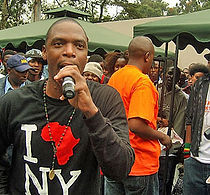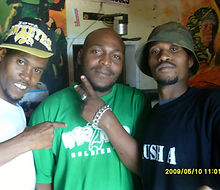
W A T E N G W A
有意識的音樂. musique consciente . ደኅና ሙዚቃ. Muziki fahamivu. واع موسيقى .


"Dini N'nini?" - Chacalito
Watengwa is a revolutionary hiphop group of musicians based in the slums of Kijenge ya juu Arusha Tanzania East Afrika. The group was established back in 1990’s by 11 members, but the group spread into many neighborhoods of Arusha. The original members of Watengwa include, Jcb, Umbwa Mzee a.k.a Chindo, Alwatan Kwele, Chacalito (Chaca), Yuzzo, Donii .a.k.a Don pronke, Chabba, D’wee, Bung’aa, Comz, Lau, Ghetto Queen, TypeY, and Chaba. Since its inception the group has grown and evolved; the gifted artists and friends of Watengwa are too many to name.
Before Watengwa came into existence many members had their own music groups, for instance; Umbwa Mzee, Donii and Rober performed together as Bootcamp, while Jcb a.k.a Degree, Lord Eyes and Spark’s group was known as Hardcore Unit. Chaca came from Aangserian, Yuzzo from Kikosi cha Mizinga, Chaba from ATF (Arusha town finest) and Kwele hailed from Dop Squad. When Hardcore Unit split up Spark went on and formed KCK while Lord Eyes started Nako2Nako. JCB initiated Watengwa, and the rest connected through various channels to build the Watengwa family and ideology.
Jcb and Umbwa have been foundational in the formation and growth of Watengwa. After Umbwa finished computer studies at Aptech Institute, he suggested they open a music studio in Kijenge ya Juu, creating an accessible and local space for Arusha artists. Up until this point, most artists needed to travel to Dar –es salaam, in order to record their music. When the studio was opened (circa 2000) the group barely scraped together needed recording equipment. Armed with an unreliable microphone, a shoddy keyboard and pirated musical software for their single computer they not only produced music but provided a platform that had empowering effects on Arusha artists and youth.
Watengwa lyrics are rooted in real life experiences, with particular attention to the worldview of Afrikans and the global flows that inform their lives. Watengwa considers themselves a revolutionary army in the fight for positive ways of confronting and surviving street life. While their music is deeply embedded in Afrikan perspectives and realities, they have been influences by western Hip-hop legends such as MC Hammer, Kool Moe Dee, Busy Bee, Public Enemy, Snoop, Dr. Dre, NWA, Warren G, Salt n Pepa, Heavy D, Wu-tang, Notorious B.I.G, Onyx, Lost boys, Guru, and Immortal Technique.

Watengwa Albums and Mix tapes.
Watengwa’s first album was launched on December 6, 2002, entitled Iliandikwa (It was written). The album was self produced and financed in Kijenge ya juu studio, and sold by Watengwa members in the streets. As their songs gained popularity, they received limited radio play; restricted by imbalances of power existing in the music industry. They were denied adequate airtime from radio djays and presenters who demanded bribes, or coerced them to commercialize their style. They were pressured to follow trends in lyrics and beats that prioritized entertainment and club life over education and advocacy. Watengwa refused to engage in bribery and did not waver in their message or sound. The album sales occurred largely in the slums of Kijenge ya juu and around Tanzania supported by those with similar values and commitments to the voices and struggles of the masses.
The second album, Full ile Laana (more than you desire) was released in 2006. The album was launched to a packed audience in Triple A complex. Produced by Omega 5 (Saidi Muya) and Umbwa Mzee, it was an instant hit in Arusha city. Watengwa made the intentional choice to self-distribute their work as a way to maintain ownership and protect profits for its members. In Full ile Laana, some of the most popular songs are “You can go ahead” and “Mi sio nyani”.
“Mi sio nyani” resonated with people because of its strong message about the hegemony of Western ideas. The song deconstructs theories of evolution that argue Afrikans evolved from monkeys. Western theories of history are taught and accepted in many Afrikan schools, but have the potential to perpetuate the damaging notions that Afrikans are primitive. While the song does not oppose the whole evolutionary theory, in questioning its assumptions it raises awareness and encourages critical thinking. Essentially it calls for increased respect and dignity, so that Africans can be regarded as powerful and contributing human beings. It promotes engagement with a different history, one that acknowledges that Africans had the first democracies, and were the first prophets, mathematicians and scientists. In this song, Watengwa addresses serious and deep-seeded internalized racism and devaluing that many Afrikans confront growing up in an inequitable world. One of the many detrimental effects on communities and youth is that they come to view themselves as incapable and lacking instead of visionaries and change agents in the cradle of civilization.
Watengwa continues its mission in educating the masses through hip-hop, and raising awareness on issues like drug abuse, empowering women, school corporal punishment, the importance of self determination, and Afrikan identity. More recent albums include Pigo Takatifu (The wholly Battle), Jicho la Tatu (Third eye), Nakala za Makalla (Copies of Makalla), and The Future. The forthcoming album is Full ile Laana Volume II currently in its final production stages in France.

Watengwa Collaborations.
Watengwa has featured and worked together with diverse and conscious musical artists such as , Mukupa, X-plastaz, Abbas Kubbaf of K- South, Hashim Dogo of Kikosi cha Mizinga, Nash Mc, Nakaaya, Ukoo Flani Mau Mau, Mc Black, Warriors from the East, Mama C, M1 of dead prez, Fid Q, Jay mo of Wateule, Zavara Mponjika Kwanza Unit, T.G.P, Majani of Bongo Records, Nako2Nako, KCK, Simon Kvamm of Nephew group from Denmark and various artist in France.

Watengwa origins




